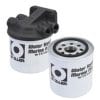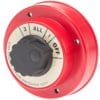 By Bob Currie, Vessel Examiner
By Bob Currie, Vessel Examiner
United States Coast Guard Auxiliary Station Galveston Flotilla.
Whenever I get a chance to talk to boaters, I like to get a feel for the typical problems they encounter on the water, especially those problems pertaining to their engines. There are so many things that can go wrong out on the water that I thought this would be a good time to discuss the most common problems and things you can do to lessen the chance of a particular problem occurring by using preventive maintenance.
The Station Galveston Flotilla of the US Coast Guard Auxiliary operates out of the USCG Station Galveston base on Galveston Island. They provide assistance to the Coast Guard by providing maritime observation patrols in Galveston Bay; by providing recreational boating vessel safety checks; and by working alongside Coast Guard members in maritime accident investigation, small boat training, watch standing, and property administration.
There are a few things you can do to troubleshoot some of the problems and limp back in. The problems tend to group in categories, and include (1) fuel problems, (2) electrical problems, and (3) mechanical problems. Simply having an awareness of the possibilities may help prepare you for dealing with them. Below are some of the most common problems.
Fuel Problems
The three most common fuel problems are (1) running out of gas, (2) water in the fuel, and (3) problems created by using gasoline which has ethanol as an additive. Yes, the Coast Guard still responds to boaters who run out of gas. My recommendation is to always top your tank off before going out. Don’t overfill though. You need room for expansion, especially during the summer months. Keeping your tank full actually helps prevent water in your fuel. Tanks accumulate moisture due to condensation. That condensation can occur only on the part of the tank not covered by fuel. Even if you do develop some water in your fuel due to condensation, a good fuel filter and water separator combination can take care of the problem. But those filters need to be periodically changed. It’s such a simple procedure, but often when I inspect a boat it is evident that the filter has never been changed. Follow the schedule in your engine manual. It is usually based on the number of hours run or length of time since you last changed it, or a combination of such (100 hours or one year, which ever is sooner, for instance).
 Fuel with ethanol in it tends to cause gumming problems in your carburetors or fuel injectors. If you have access to ethanol-free gas, I envy you, because you can eliminate this problem by paying a few cents more for gas that is ethanol-free. The rest of us do what the marine engine manufacturers recommend and add a fuel additive that is designed to stabilize gasoline that has ethanol added. Follow your engine manual. As a reminder, use one third of your fuel going out, one third to get back in, and one third for reserve. If you go out in the morning, you will almost always have a following wind pushing you. When you come back in, you will be fighting the wind. If you find yourself with a half a tank of gas when you decide to return, then reduce speed to below the speed you used to get out there. Fuel consumption greatly increases with speed. If you cruised out at 2/3 throttle, cruise back at half throttle to increase the chances that you will make it back home.
Fuel with ethanol in it tends to cause gumming problems in your carburetors or fuel injectors. If you have access to ethanol-free gas, I envy you, because you can eliminate this problem by paying a few cents more for gas that is ethanol-free. The rest of us do what the marine engine manufacturers recommend and add a fuel additive that is designed to stabilize gasoline that has ethanol added. Follow your engine manual. As a reminder, use one third of your fuel going out, one third to get back in, and one third for reserve. If you go out in the morning, you will almost always have a following wind pushing you. When you come back in, you will be fighting the wind. If you find yourself with a half a tank of gas when you decide to return, then reduce speed to below the speed you used to get out there. Fuel consumption greatly increases with speed. If you cruised out at 2/3 throttle, cruise back at half throttle to increase the chances that you will make it back home.
Electrical Problems
Most electrical problems boil down to bad connections due to corrosion or battery problems. Check all of your electrical connections for corrosion. Never use a wire nut to make a connection. Instead use crimp connectors that are heat-sealed. Here are some things you can do as preventive maintenance for your batteries and electrical system:
Battery Care
Get the most from your boat’s batteries by following these guidelines:
- Keep your batteries fully charged. Leaving a battery even partially discharged leads to sulfation and loss of capacity.
- Check the electrolyte solution level regularly. Top up as necessary with distilled water to keep the level about ¼” above the plates.
- Use only distilled water for topping up. Trace minerals and chlorine from tap water really do shorten battery life.
- Fill cells only after charging. If you fill them before, expansion during charging will pump electrolyte out on top of the battery, causing a corrosive mess and reducing the acid concentration inside the battery.
- Keep the top of the case clean and dry. Most boat batteries have a cover for just that purpose. Dampness, dirt and acid on top of the battery case can create a circuit between the terminals that will drain the battery or lead to stray voltage that can destroy your electronics.
- Keep terminals and cable clamps corrosion-free. There are commercial products such as dielectric grease you can use to coat the terminals to help prevent new corrosion.
- Make sure the positive terminal of the battery is covered.
- Secure the battery correctly. An unsecured battery will not pass a Coast Guard Vessel Safety Check. The battery must withstand a 75-pound pressure from the side without tipping over under Coast Guard regulations.
- If the battery is discharged to such an extent that it cannot crank the engine, and hence the engine has to be started by other means, then the alternator can not recharge the battery. When this condition arises the battery must be removed and bench-charged, because the voltage required to restore it is higher, and that higher voltage cannot be provided by the charging system of the boat.
Boat Battery Cut-Off Switch
 We have already said that even partially discharging a battery reduces its life. In salty air like we have on the coast, it is easy for low voltage stray circuits to be established. These stray circuits not only discharge your battery over time, they play havoc with your electronic instruments. Many new boats come with a battery cut-off switch that disconnects the battery from all possible routes of stray currents. This switch is also a fire safety item. If you have an electrical fire on your boat due to a short, you can cut off the source of electricity by placing your battery cut-off switch in the Off position.
We have already said that even partially discharging a battery reduces its life. In salty air like we have on the coast, it is easy for low voltage stray circuits to be established. These stray circuits not only discharge your battery over time, they play havoc with your electronic instruments. Many new boats come with a battery cut-off switch that disconnects the battery from all possible routes of stray currents. This switch is also a fire safety item. If you have an electrical fire on your boat due to a short, you can cut off the source of electricity by placing your battery cut-off switch in the Off position.
Mechanical Problems
We all know that a gasoline engine needs fuel, air, and electrical spark to run. We discussed some fuel and electrical problems and solutions, but there are some mechanical problems that often crop up as well. When is the last time you cleaned or changed your air filter? I can remember when many marine engines didn’t have air filters, but most do today, and a clogged air filter can cause you to run your battery down trying to crank the engine. Your engine manual has a schedule for changing spark plugs, and I highly recommend you follow it, especially if you are the do-it-yourself type. Keep in mind that those spark plugs should be tightened using a torque wrench. You may be tempted to tighten them using your own judgment, but that can have some serious consequences. If you over-tighten, you run the risk of galling the threads of the engine head, necessitating an expensive replacement. If you under tighten, you run the risk of the spark plug self-ejecting from the cylinder head, and that often causes thread damage to the head as well.
Follow your engine manual’s scheduled maintenance for checking the tightness of bolts. If you hear a funny engine sound when running or cranking, there is a mechanical problem that must be found, or you run the risk of complete failure out on the open water. Starter bolts are notorious for self-loosening due to the serious torque the starters produce when cranking an engine. Follow the maintenance schedule for your lower unit as well. A friend lost his prop shaft and propeller the other day. I don’t know the cause, but I know his prop shaft requires you to periodically replace the special grease in the lower unit by opening a drain valve and pumping special grease into the lower unit until fresh grease comes out the drain hole. Many boaters keep a spare propeller, propeller backing nut and cotter key on board in case they damage or lose their propeller. That is not a bad idea.
If All Else Fails
If you find yourself dead in the water due to engine failure, you need to have a means of communication that will result in help arriving. If you boat within 20 miles of shore, a marine VHF/FM radio is your best chance of summoning help. Handheld walkie-talkie type marine radios are quite inexpensive. Cellular service is spotty or nonexistent offshore.  If you go out further than 20 miles routinely, you should consider a satellite phone, an EPIRB (Emergency Position-Indicating Radio Beacon), and/or a PLB (Personal Locator Beacon). The PLB should be attached to your life preserver. Below is the one I wear on Auxiliary patrols. It was issued to me by the Coast Guard Auxiliary. If you have an EPIRB or PLB, don’t forget to register it and reregister it annually.
If you go out further than 20 miles routinely, you should consider a satellite phone, an EPIRB (Emergency Position-Indicating Radio Beacon), and/or a PLB (Personal Locator Beacon). The PLB should be attached to your life preserver. Below is the one I wear on Auxiliary patrols. It was issued to me by the Coast Guard Auxiliary. If you have an EPIRB or PLB, don’t forget to register it and reregister it annually.
In addition to having a good method of communication, the Coast Guard and I recommend that you obtain towing insurance. It is well worth the peace of mind, and is quite reasonable in cost. If a commercial tow is available, the Coast Guard will often recommend you to them for assistance.
Summary
Many problems that can strand you out on the water can be prevented by simply following your boat, battery and engine manufacturers’ schedule of preventive maintenance. Keep your electrical connections clear of corrosion using simple cleaning methods, and use a commercial electrical connection corrosion inhibitor. Keep your batteries charged and your fuel tank full. Use fuel stabilizer in your fuel. Be prepared for a possible stranding by having a reliable means of communication with the Coast Guard.
For more information on boating safety, please visit the Official Website of the U.S. Coast Guard’s Boating Safety Division at www.uscgboating.org. Questions about the US Coast Guard Auxiliary or our free Vessel Safety Check program may be directed to me at [email protected]. I am available to perform free Vessel Safety Checks, and I will come to your location to perform them. SAFE BOATING!
[8-5-2019]

 Posted in
Posted in 
























